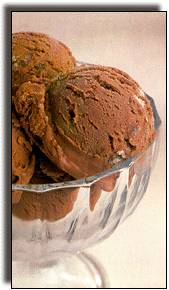Russians refuse to eat ice cream despite their great fondness for the product
Russian people do not go to special ice cream cafes to enjoy the taste of the product there
The majority of Russians like eating ice cream. National ice cream makers offer a variety of products and constantly renew their range. However, Russian people do not eat much ice cream as the industry would like them to. Unlike other developing food enterprises, the market of ice cream has been experiencing a stagnant period during recent several years. The annual growth of the ice cream production is not higher than 3-4 percent. Spokespeople for Russian ice cream companies say that the situation has been caused with unfavorable weather conditions and insufficiently developed culture of ice cream consumption. 
About 82 percent of ice cream-making companies believe that the drop in production has been caused with the weather factor. The largest sales volume traditionally occurs in summer, which is usually rather short and not very hot in Russia.
”Family ice cream” produced in large plastic containers can become a way out of the situation. This ice cream is meant to be eaten at home, which makes it less weather-dependent. The family-oriented segment of the ice cream market will be developing most actively, spokespeople for ice cream-making companies believe. Aleksei Drobinin, the vice-president of the group of companies AlterVest, believes that the family ice cream will not enjoy a very large demand on the market. The entrepreneur thinks that Russian models of fridges are not big enough to store such containers of ice cream. On the other hand, the majority of Russians prefer to buy small, 500-gram packs of ice cream.
Market members are certain that Russian people's attitude to the consumption of ice cream should be changed: it should become “more civilized.” Russians do not go to special ice cream cafes to enjoy the taste of the product there. Ice cream cafes have never been profitable even in the Soviet Union. Baskin Robbins became the only exception: it organized a heavy advertising campaign in Russia, and probably chose a very good time to enter the market. The US company opened its first ice cream cafes at the time, when there were no grand entertainment complexes in Moscow, or just nice decent places, where people could spend good time in. There are about 110 Baskin-Robbins cafes on the territory of the former USSR now – from Kiev in the west to Vladivostok in the east. However, the chain of ice cream cafes does not have much competition in Russia.
The Russian company Ramzai attempted to establish a network of ice cafes in Moscow, but it eventually had to change the format of their activities. Now the company owns cafe-restaurants, where people come to eat not only ice cream, but other food as well. The director of Ramzai's ice cream department, Oleg Kovalenko, says that cafe-restaurants do not comply with the company's basic business and will most likely be sold.
Russian ice cream makers intend to join their efforts and advertise the industry across the nation. The Russian market of ice cream, however, has to face other problems, which are common for all other ice cream producers in the world. The decreasing birth rate cuts the most devoted category of ice cream consumers – children under 15 years old. In addition, confectionary has been gaining more and more popularity among Russians, not to mention soft drinks, chips and beer among teenagers. Finally, the growing prime cost of ice cream is also a very important factor that creates the critical situation for the industry. Ice cream producers are conducting rather tough price policies too. Prices on ice cream are expected to gain ten percent in forthcoming spring, which will definitely exert a negative influence on the situation in the industry.
There are about 300 ice cream-makers in Russia nowadays. Experts believe that that the industry is experiencing a setback because of the large number of ice cream enterprises. It is not ruled out that the market may soon experience a series of mergers and takeovers.
Subscribe to Pravda.Ru Telegram channel, Facebook, RSS!





